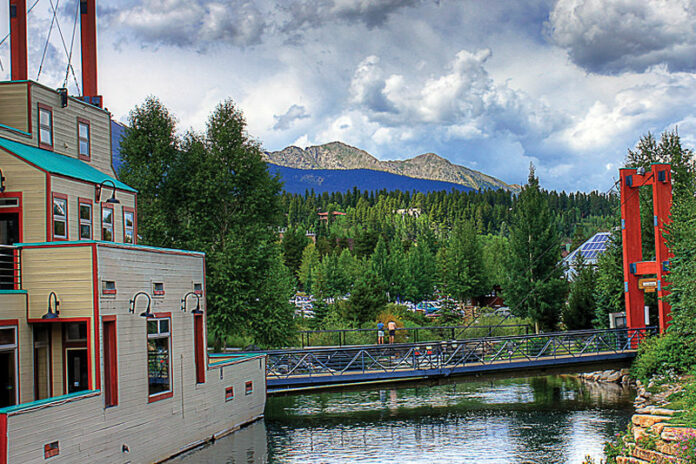
In one Colorado town, cannabis revenue helps pays for the police force
California legalized recreational cannabis in January of this year, and thus far local government officials have had eight rather confusing months, trying to get ahead of problems, balance competing interests and figure out how this whole thing is going to work.
They’re not the first to go down this road. Colorado legalized recreational cannabis in 2012. Rural counties and small towns there have had more than five years of experience dealing with the panoply of challenges and opportunities that legal cannabis produces.
Breckenridge: A new kind of winter wonderland
Shannon B. Haynes is the assistant town manager of Breckenridge, a ski resort town 90 miles west of Denver with a population of almost 5,000. Breckenridge has granted “14 or 15 licenses” for cannabis businesses in town, Haynes said. Most of these permits are for retail establishments, but they also have some growers and one producer of CBD oil. (Each type of business requires a separate license.)
In Breckenridge, most of the retail operations are small growers as well, though this seems to be changing as people identify their strengths and choose to focus on one form of the business or another.
Haynes served as the town’s chief of police before moving into the town manager’s office, so she’s in a unique position to explain how legalization played out in her town.
Her advice? Expect the unexpected. “We had all these ideas about what was going to happen when marijuana was legalized,” she said. “But almost none of those things happened. Truthfully, we expected it to be a much bigger issue than it was. It’s not that there are no problems; they’re just not the problems we expected.”
“What we anticipated was that we’d have a lot of problems with public consumption, so we did a lot of education up front about how much you could possess and where you could use it. Ultimately, though, that turned out not to be a problem. We didn’t have open consumption issues.”
Instead the town had issues around edibles and edible serving sizes. “The problem was that serving sizes were not what you’d expect. Like they’d sell a regular-sized brownie that, in terms of THC, was actually 10 serving sizes. You weren’t supposed to eat the whole thing — you were just supposed to take one bite, but who takes one bite of a brownie? People just weren’t used to that, so they’d eat the whole thing and then they’d feel sick because they’d overconsumed.”
“So we did a lot of work with educating consumers and working with the producers and manufacturers to make more realistic serving sizes and better packaging.”
As a resort town that draws tourists from Colorado and other states, Breckenridge also ran into a peculiar problem with hotels.
“People from places where marijuana was still illegal would buy edibles here and then wouldn’t consume them all, so they’d just leave them in their hotel rooms when they left, and then the housekeeping staff — it’s kind of an unwritten rule around here that housekeeping can consume things they find in the rooms after guests have left — well, the housekeepers would think, ‘Oooh, a candy bar!’ or ‘Oooh, a brownie!’ They didn’t realize what it was — so again, you had some overconsumption issues, and people not being able to finish their shifts.”
“That was something we jumped on right away — in part because we were really worried about what would happen if someone took something home for their kids. (Happily we never heard about that happening.)”
Haynes says that one of the smartest things that the town of Breckenridge did was to take a portion of the tax windfall from marijuana sales and spend it on a police officer who deals solely with cannabis issues. That officer investigates complaints about cannabis, enforces the town’s marijuana laws and runs their cannabis-related education campaigns.
In the case of the housekeeper issue, the town’s cannabis officer created an education campaign in Spanish, since most of the housekeepers there are Spanish speakers. “We worked with the local resorts and hotels and got their housekeeping staff together and showed them photos of different packaging to watch out for and what to look for — like this particular leaf or design on the packaging,” Haynes said.
As the town’s former police chief, Haynes says she didn’t see an increase in crime with legalization. “We’ve had very little crime. We’ve had a couple of shops broken into, but the perpetrators were only interested in plants, cash and product. There’s been no violence.”
Nor has she seen any home invasion robberies linked to cannabis.
The biggest cause of complaints around town is the odor, which seems to be a chronic, low-level problem.
“We do have issues with odor, particularly in the area to the north of the center of town where all the cannabis businesses are. (We had a debate in town about whether to allow them on Main Street, and the town decided not to do that, so there’s a pretty small area where they’re allowed to operate.)”
“The issue is when the plants are budding — or when the business hasn’t changed their filters. So we warn them, and they change the filters and that fixes it for awhile, then it starts all over again.”
Haynes said the challenges of legal cannabis have changed over the years. Right after legalization, for example, the town was swamped with college kids wanting to get in on the action.
“That first January we ended up having thousands of college kids descend on the town, then later that summer a bunch of transients arrived, but they left when the summer ended and never came back because Breckenridge isn’t very desirable for the homeless — it’s too cold.”
Years on, as the initial excitement of legal cannabis has died down, the town has shifted to long-term programs focused on education about cannabis, especially for youth. It is illegal for any one under 21 to use cannabis in Colorado.
“We are doing a lot of work locally with youth, and we’re seeing a changing dynamic — there’s always been a percentage of teenagers who smoked pot, but now that it’s legal, kids see it as mainstream.”
“Interestingly, we’ve also seen an increase in tobacco use, what with vaping and e-cigarettes, and there’s this perception that these things (vaping and cannabis) aren’t harmful. We’re having to work a lot harder on the youth side of things. We don’t use scare tactics — we just try to give real information, like about cannabis’ impact on brain development and that impact on your life if you get caught, in terms of college and involvement in high school sports or extracurriculars.”
While the town’s police no longer bust adults for using, growing, or selling marijuana, they do spend a bit of time busting minors for using fake IDs while attempting to buy marijuana.
“It’s different than trying to use a fake ID in a bar, which kids have tried to do since forever,” Haynes said. “Most bartenders, if they don’t think you’re 21, will just keep your fake ID, and that’s that. But marijuana dispensaries are legally required to have security video cameras. So our compliance person can find kids using social media and then issue a summons. We’ve had some very shocked under-21 age kids — and some very shocked parents whose kids have received summonses. But we work with them. It’s been an education for them and for us and a bit of work for the police department.”
Although cannabis has been legal for almost seven years in Colorado, Haynes says there are still people working in the black market, as both growers and sellers.
“We have heard that the black market is still running pretty strong,” Haynes said. “The taxes on legal marijuana are fairly high: state and local combined are 28 percent around here. That’s why there’s still a black market — it’s cheaper to buy it illegally, and if you sell illegally, you don’t have to pay taxes. But it’s not any worse than what it was before legalization. And there is still plenty of opportunity for profit on the legal side, and it’s bringing in a significant amount of revenue for the state.”
De Beque: Back from the brink thanks to cannabis
One hundred and fifty one miles west of Breckenridge in the tiny town of De Beque, (population 500), City Manager Lance Stewart knows all about the benefits of cannabis for small town government. De Beque (pronounced “de-beck) has four dispensaries, two manufacturing operations for CBD oil and one large grow operation, which sounds like a lot for a town of that size. But all of them do a brisk business.
Stewart says that De Beque, which is located on interstate 70, capitalizes on the large number of towns and counties in Colorado that have banned marijuana businesses of any kind.
Local governments can’t ban the personal use of marijuana — that’s allowed by Colorado state law — but, like California, they can choose whether or not to allow cannabis businesses inside their city limits or in unincorporated county areas.
De Beque basically operates as the dispensary for a large swath of Mesa County (population 148,513) that includes the town of Grand Junction (population 61,881), where cannabis businesses are not allowed.
“What we did here, was that we applied a special sales tax of 5 percent on every cannabis sale,” said Stewart, whose entire salary is paid by cannabis revenue. “We looked at it as a way to supplement our annual budget, which was hemorrhaging, and it has worked out really good for us.”
De Beque once got most of the money it needed to run the town from the oil and gas industry. “We got $260,000 in 2006, but by last year, that had dropped to $14,000. But revenue from cannabis has completely replaced that, and more. We get around $500,000 a year from cannabis taxes.”
The town has agreed to license four dispensaries, four grow operations and four manufacturing facilities, should others wish to apply.
Cannabis revenue accounts for 50 percent of the city budget. “We rebuilt our truck route through town, which was falling apart. We replaced a couple blocks of sidewalk, curb and gutter around the school. Plus, it funds a department of four people which includes a school resource officer, two police officers and me,” Stewart said.
Stewart says he has seen no downsides to legalization.
“There was a whole lot of misinformation that split the community quite severely during the initial fight over legalization here. We were warned to expect invasions of hippies and homeless people, all stoned and walking around like zombies, and stoned kids. None of that occurred. I can honestly say I don’t think we’ve had one arrest having to do with marijuana in two and a half years. And we’ve seen no increase of marijuana use in our school.”
Stewart also says legalization has not led to more drug use of other kinds. “We have the same issues with hard drugs that we’ve always had — mostly crack cocaine and meth — which comes in on the interstate. The difference is now we have the law enforcement personnel to deal with it, because about half our marijuana revenue goes to law enforcement.”
Despite the funds flowing into city coffers, Stewart admits that the town’s newfound prosperity feels precarious. U.S. Attorney General Jeff Sessions’ announcement in January that he planned to crack down on marijuana nationwide sent chills throughout Colorado.
And now De Beque faces competition from another small town, Palisade, which is located closer to Grand Junction.
“We’ve seen a dip in revenues since the dispensary opened in Palisade last November.”
Still, he would not go back. “It was a good move on the part of the board of trustees, and it was somewhat a move of desperation. We’d tried legalizing gambling, but that didn’t fly. Then, once it became legal, we looked at marijuana and legalized that and now we’re starting to see the benefit of that decision, so hopefully it’ll continue into the future.”








